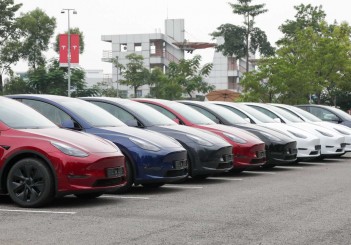That will be possible for owners of SAIC Volkswagen cars in China in the near future, with a new partnership the carmaker and online shopping giant JD.com announced on Wednesday.
SAIC Volkswagen’s Passat cars and other models produced this year will come with JD.com’s smart home services built in, the companies said in a statement.
When linked to users’ home appliances, the system will allow them to control their home appliances while inside the cars through voice commands or the vehicles’ touchscreens.
Users can also set the system to switch home appliances on or off automatically when their cars are within a certain range of their homes.
For example, by saying the words “turn on ‘going home’ mode”, the system can be triggered to turn on the lights, air conditioner and water heater once the car is within a certain distance from home. Drivers will also be able to view the quality of the air and security of their home from the screens in their cars, the companies said.
Smart vehicles and smart homes are part of the so-called internet of things (IoT), or devices that are connected to the Internet and can communicate with each other.
While smart home devices have been popular for years, connected cars have also been gaining traction gradually, with the proliferation of faster internet speeds and the rising use of smart devices.
Globally, the connected car market is expected to reach US$197bil (RM858.52bil) by 2026, according to US-based market research and consulting firm Reports and Data. Apple launched its in-car interface CarPlay as early as 2015, while Google introduced its equivalent, Android Auto, in the same year. More than 500 car models from 60 different auto brands now support Android Auto, according to Google.
China, the world’s largest automobile market, wants 30% of all new cars sold by 2025 to be “intelligent connected vehicles” with a range of automated features, according to a draft plan released by the Ministry of Industry and Information Technology.
Last year, Alibaba Group Holding – the largest e-commerce player in the country – teamed up with auto giants Audi, Renault and Honda to integrate its smart speaker, Tmall Genie, with the brands’ new cars. Alibaba is the Post’s parent company.
The partnership offered car owners a range of voice-controlled services such as the identification of nearby attractions and the ability to book tickets and order items while driving, and also allowed those with paired Tmall Genie smart speakers at home to monitor and control their smart home devices remotely while driving.

JD.com, the second-largest e-commerce player in China, marked its first entrance into the connected car market in 2018 with a partnership with Chinese automobile manufacturer Geely. It has since teamed up with other domestic carmakers such as Dongfeng Venucia and FAW on similar initiatives to deploy smart speakers in cars.
Competition in the segment is heating up though and JD.com will need to differentiate its products from other major tech platforms that are looking to enter the connected car market, such as by collaborations with real-estate developers to provide integrated smart home solutions that can be linked with connected cars, according to Jason Low, a senior analyst at tech market research firm Canalys.
“The top three major platforms in China – Baidu, Alibaba and Xiaomi – are also tackling the automotive market in China,” Low said. “It will be highly challenging for JD.com as its rivals are better established in the smart home area, and they are also willing to invest to create new partnerships and services to win the market.”
Another key challenge for IoT manufacturers, according to Low, is security. “As of now, the risks are expected to be low as the smart systems that are being put in place will not have full control of the car’s critical driving and safety systems,” he said.
“But in the long-term, especially as cars become fully autonomous, this will become an area of high concern which solution providers and car manufacturers will have to address fully.”
JD.com’s IoT platform, JD Whale, currently connects more than 150 million devices from over 1,000 brands, it said in the statement, adding that the platform has enabled over 25 million families in China to control all of their home devices and make purchases by voice command since its debut in 2015.
Going forward, JD.com and SAIC Volkswagen – a joint venture between Germany’s Volkswagen Group and China’s SAIC Motor – are also planning to launch “smart maintenance services” which will allow owners of SAIC Volkswagen cars to check the overall condition of their vehicles from home and view customised recommendations for maintenance services.
“When we think about travel functions, what we think about most is how to connect the car with the outside world, how to take the car as the key connecting point, and how to provide a real experience of connectivity for living,” said Ying Gao, senior product manager at SAIC Volkswagen Mobile Internet.
“JD will continue to fully leverage our IoT and AI (artificial intelligence) technology capabilities, supply chain and merchandise to provide technology and services for our partners,” said Yazhuo Wang, General Manager of IoT Solution and Product at JD Cloud & AI. – South China Morning Post










